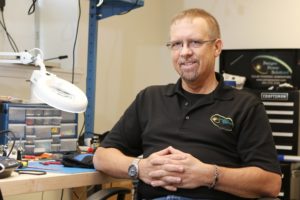
Back to work at his shop in Westminster, survivor George Colonna has not had a recurrence of throat cancer after one year.
by Linda Esterson, photography by Bill Ryan
George Colonna is content sitting on his deck with a beer in his hand, watching the sun set through his telescope.
An admitted naturalist, Colonna, 52, has always been in touch with nature and the universe. On a clear night, he can see major constellations from his Hampstead home.
Not one to take things for granted, he acknowledges that today, he values simple pleasures a little bit more. In February, he celebrated one year since his last radiation treatment after a nasty battle with throat cancer.
“I do feel lucky to still be able to partake in that part of life,” he says.
Colonna is part of the growing population in the United States who are diagnosed with throat cancer, and recent studies have shown a connection between oropharyngeal (back of the throat, including the base of the tongue and tonsils) cancer and the Human Papilloma Virus (HPV). According to a Centers for Disease Control (CDC) study of the population from 2009-2013, oropharynx cancer occurred in 16,479 patients and 70 percent of those cancers were caused by the HPV virus. The National Institutes of Health (NIH) also attributes a causal relationship between throat cancer and HPV 70 percent of the time, with 50 percent of those cases linked to HPV type 16.
Colonna was diagnosed with throat cancer after a lump he found in the side of his throat while shaving was removed in September 2015. The tumor was the size of a robin’s egg, and the pathology study revealed HPV marker P16, which has been tied to several cancers including throat but also cervical, penile, anal, and vaginal cancer.
“I don’t recall them specifically telling me it was related, but it was their best guess,” he says. “They couldn’t find anything else.”
NIH cites other factors increase the risk that an infection with a high-risk HPV type will persist and possibly develop into cancer. For oropharyngeal cancer, factors include smoking or chewing tobacco, poor oral hygiene and a weakened immune system. Colonna is a former smoker, having quit in 1992 after partaking for more than a decade. In addition, he grew up on the Eastern Shore, where the cancer rate is high, which he attributes to pesticides, exposure to oil, and contaminated drinking water. Grandparents on both sides of his family battled cancer.
Today, Colonna estimates his body is 90 to 95 percent recovered. What helped was getting back to work, running his solar power company, Perigee Power Solutions, and resuming a former career as a part-time cook for several restaurants in Westminster. He’s also watching his diet, eating as much organic foods as possible.
He does have daily reminders of the ordeal, however. The neck surgery required severing a nerve to reach the tumor, and left scar tissue that causes varying stages of discomfort from numbness to tingling to dull pain around the three-inch incision. He also feels discomfort in his throat. The constancy gives him concern that the tumor is growing back. Rubbing it often to check provides additional pain.
“It has gotten better over time, but I can tell when it’s going to rain,” he explains. “I’m always aware of it. It never goes away completely.”
Colonna is also dealing with dryness in his mouth and throat, and he still sleeps with a CPAP machine with a humidifier, originally used to treat his sleep apnea when he weighed 50 pounds more. He keeps a water bottle by the bed so he can drink two to three times each night.
“I’m thankful I can get up every morning,” he says.
Colonna endured what he dubbed “hard core” chemotherapy and radiation “to try to kill whatever was in there.” After difficult side effects from the chemo, including severe ringing in his ears, that course of therapy was discontinued.
The hard-hitting radiation knocked him down by the sixth week, and it continued for three more. Today he understands why people contemplate or commit suicide; something he previously felt was a “cop-out.”
“Most of the time we go through our daily lives and don’t think about what’s going to happen when we’re gone,” he says. “It’s the first time I really contemplated that I could die.”
Survivor Terri Warehime
Terri Warehime’s voice is raspy now, and she’s learned to accept the little things that may be irritating or don’t go her way.
She’s starting to taste the sweetness of some foods, she’s able to enjoy a motorcycle ride and her biker group parties, and she’s planning for her return to work in the finance department at Random House in early June.
When she prepares dinner for her husband, she eats little, but then downs a can of Ensure. She’s glad that she can.
A persistent earache and occasional hoarseness sent her to her otolaryngologist’s office in spring 2016. Instead, he expressed concern over a pea-sized lump on the side of her neck, something she hadn’t noticed. Blood tests were negative, but a scan showed a growth on her tonsil. The biopsy was positive for cancer.
“This really threw me into a tizzy because it came out of left field,” Warehime says. “I had never been sick before other than a four-day flu.”
She was not a smoker, but she confirmed she had been diagnosed with HPV five years earlier from an annual pap smear at the gynecologist. Her ENT tied her throat cancer to the virus after seeing lab results. He told her she had a long road ahead, but it was curable. Two weeks later, she was meeting with the cancer team at the Greater Baltimore Medical Center, experiencing what she called “major information overload.” She went into a tailspin, and became depressed.
Surgeries removed the tumor and three groups of lymph nodes, installed a port for chemotherapy, and inserted a feeding tube, although she was adamantly opposed. Doctors insisted as mouth sores and difficulty swallowing would deter her interest in eating.
She refused her favorite flavor of ice pop – cherry – as it tasted like rotten berries. When eating Jell-O, she had to ask about the flavor because there was no taste. It was hard to eat when foods tasted sour or had no taste at all. Five to six cans a day of Ensure kept her going.
Today, after surgeries, seven weeks of daily radiation and three rounds of chemotherapy, as well as extensive dental treatments, physical therapy and mental health counseling, her outlook is different. She doesn’t take anything for granted.
Sure, she sleeps with a special hood to put pressure on her head and neck and will do so for the remainder of her life. She uses a lymphedema pump an hour each day to direct fluid around her body and stimulate the lymphatic system. And she avoids acidic foods, carbonated drinks and alcohol which burn her throat. Eating tires her out, but that will improve with time, she says.
“I’m one of the lucky ones, she says. “It’s in remission and I’m 99 percent sure I’m not going to die.
“It’s been a very good learning experience for me. I’ve been able to empathize with other people about what they’re going through and not sweat the small stuff. Most of it is not important.”


